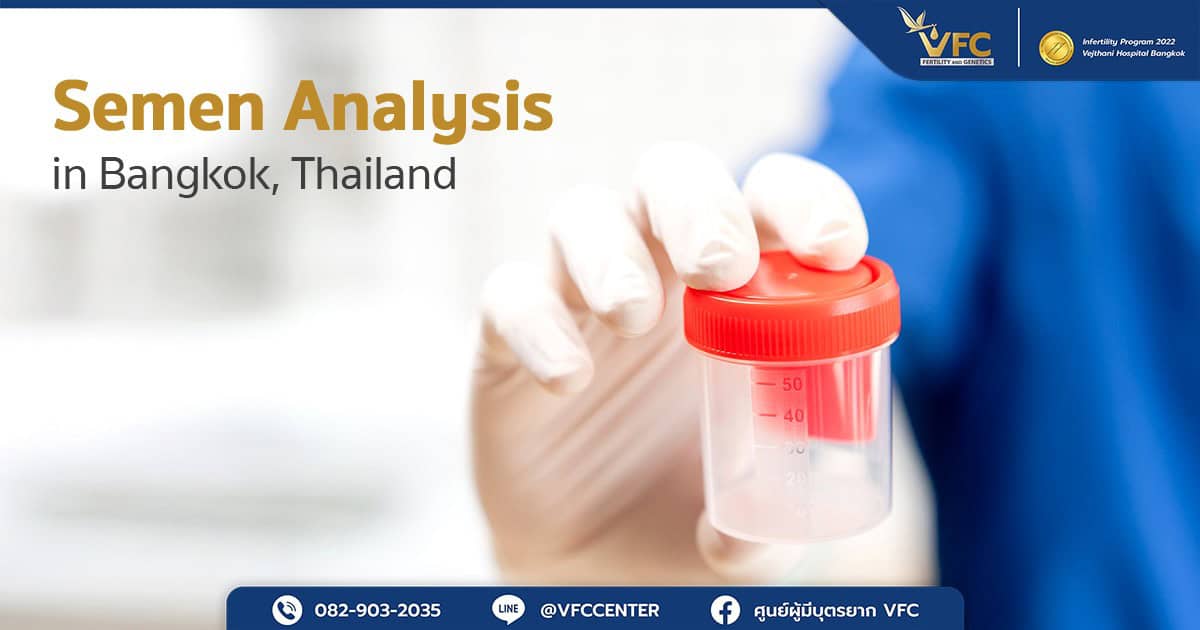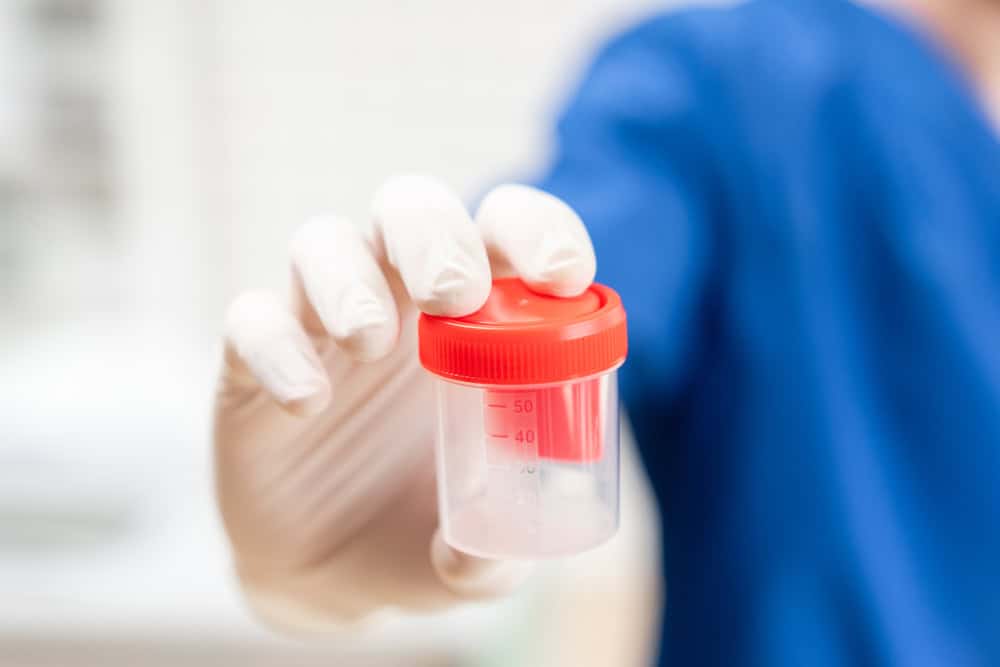
Infertility is not just a concern for women—male infertility plays a role in nearly half of all fertility issues among couples. Male infertility affects an estimated seven percent of the population. Despite this, many men are unaware of the factors that contribute to their reproductive health and how to address them. For couples in Thailand struggling to conceive, a semen analysis is one of the most effective tools to assess male fertility and determine potential causes of infertility.

A semen analysis evaluates several key fertility factors, including sperm count, motility, morphology, and overall semen quality. If you and your partner have been trying to conceive for over a year without success, a semen analysis at a reputable fertility clinic like V Fertility Center (VFC) in Bangkok can be a crucial step toward understanding your reproductive health and receiving a personalized treatment plan.
Common Causes of Male Infertility
Many couples facing infertility issues remain in the dark about what options are available to them or what steps to take. In the case of male infertility, specialized tests, such as semen analysis, are available at fertility clinics in Thailand to help identify the root cause of the problem, which may include:
Low sperm count or poor sperm quality are significant factors contributing to male infertility. Low sperm count, known as oligospermia or oligozoospermia, is defined as having less than 16 million sperm per milliliter of semen. Poor sperm motility, known as asthenospermia or asthenozoospermia, occurs when sperm are unable to swim effectively toward an egg for fertilization. Generally speaking, it remains undiagnosed until concerns arise. A semen analysis can be performed to help identify the fertility issues at hand.
Blockages in the reproductive tract are a common issue in male infertility. While they don’t directly affect sperm production, a blockage in the reproductive tract will affect sperm quality and quantity by inhibiting the sperm’s ability to exit the body. Common causes of blockages include infection, trauma, congenital issues, and post-surgical complications.
Genetic disorders such as cystic fibrosis, Y chromosome microdeletions, and Klinefelter syndrome are some of the lesser common causes of male infertility. Although these conditions make it more challenging to treat infertility, there are still treatment options available.
Hormonal imbalances affect sperm production, mobility of sperm, and overall fertility. The most common hormones involved in male fertility are testosterone, the luteinizing hormone (LH), and follicle-stimulating hormone (FSH). When these hormones are out of balance, it can lead to fertility issues and, in more severe cases, infertility. Early detection and healthy lifestyle choices are key to improving fertility outcomes.
Infections in the reproductive tract are a common cause of male infertility, with sexually transmitted diseases (STDs) and urinary tract infections (UTIs) being the most common. Both STDs and UTIs can lead to epididymitis, an infection in the tubes that carry and store sperm. If left untreated, severe infections can lead to scarring, which often results in fertility issues.
Lifestyle factors can also contribute to infertility in men. Smoking, excessive alcohol consumption, and obesity are all linked to low sperm production. Drug use, stress, and poor diet can all lead to hormonal imbalances that also affect fertility. However, prioritizing a healthy lifestyle that includes regular exercise, a healthy diet, and sufficient sleep can significantly boost fertility outcomes.
Male Infertility Testing Process With a Semen Analysis in Thailand
Consultation and Semen Analysis
The systematic process of diagnosing male infertility begins with a medical examination and physical evaluation performed by either a general physician or a urologist. Once the initial assessment has been made, most patients will be scheduled for a semen analysis, the most common tool in diagnosing male infertility.
The semen analysis procedure in our Bangkok clinic is quite straightforward. It’s a non-invasive procedure that involves collecting a semen sample for testing. Sperm count, sperm motility, sperm morphology, and semen volume and quality will all be analyzed. The results from a semen analysis are crucial in helping identify potential fertility issues.
Hormone Testing and Imaging Study
Hormone testing is a simple blood test to check testosterone, FSH, and LH levels that could be contributing to infertility and help guide future treatment options. Another non-invasive procedure in male infertility testing is the use of imaging studies. Ultrasound imaging, MRIs and CT scans can all be used to detect blockages in the reproductive tract or structural defects in the reproductive organs.
Genetic Testing
Genetic testing may also be advised to help identify any underlying health conditions affecting male fertility. Male and female infertility testing is the first step for couples interested in pursuing in vitro fertilization (IVF).

Treatment Options for Male Infertility
Once a semen analysis has been completed at our Bangkok clinic and male infertility has been diagnosed, a urologist or reproductive endocrinologist will discuss various treatment options and courses of action. Treatment options for male infertility will depend on the results of your initial examination.
The V Fertility Center in Bangkok, Thailand, one of the country’s leading fertility clinics, offers comprehensive treatments available for couples struggling to conceive. Depending on the results of your semen analysis, several fertility treatment options may be available, such as surgical sperm retrieval (SSR), a minimally invasive procedure performed when traditional semen collection methods are not possible. The procedure consists of extracting sperm directly from the testicles or epididymis for men with low or no sperm in their ejaculate. It is typically an outpatient procedure, allowing you to return home the same day. It is recommended that sperm retrieval aligns with your partner’s egg retrieval to ensure that fresh sperm is used for fertilization.
If hormonal imbalances are detected, hormonal therapy using medications may be prescribed to improve sperm production. Lifestyle changes may also be recommended, which include improving diet, exercise, and reducing stress to enhance sperm quality.
If sperm motility or morphology issues are present, Intracytoplasmic Sperm Injection (ICSI) can improve fertilization rates by injecting a single healthy sperm directly into an egg.
<H2> Book Your Appointment Today
Renowned for its expertise in fertility treatments, the V Fertility Center is here to support and guide you through your fertility journey. Offering a comprehensive range of services in Bangkok, including semen analysis, the V Fertility Center aims to make starting a family as stress-free as possible. Book a consultation with our specialists to discuss getting a semen analysis at our Bangkok clinic today.

OBSTETRICS AND GYNAECOLOGY-REPRODUCTIVE MEDICINE





No Comments
Sorry, the comment form is closed at this time.